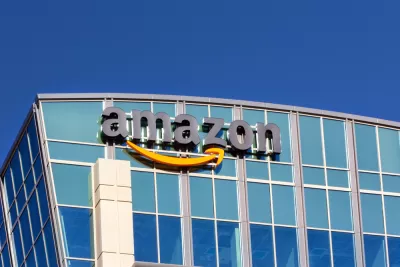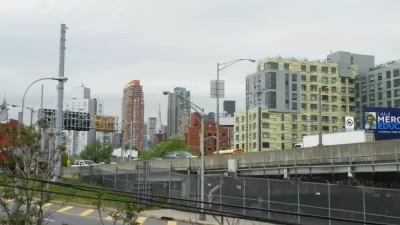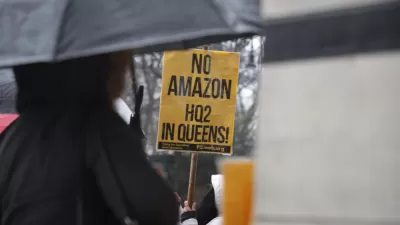With a second headquarters, Amazon is poised to expand its preference for walkable places into a new city. However, maybe the company should take the high road and not beg for subsidies.

Amazon dropped a bombshell earlier last week when it announced that it's going to expand beyond Seattle, building a brand new second headquarters in another city. Based on the qualifications in Amazon's RFP, like on-site access to transit and connectivity options like sidewalks and bike lanes to “foster connectivity between buildings/facilities,” this is another example of how companies are increasingly seeking out vibrant, walkable, connected urban places as they try to attract and retain talent.
Here, Michael Rodriguez, Director of Research at Smart Growth America, discusses why many corporations are moving to vibrant urban locations, and why corporations need those environments to compete. Rodriguez argues that the best model of economic development forgoes tax breaks and subsidies in favor of supportive policy and infrastructure that enables companies to attract talent.
"Instead of subsidies, Amazon should insist on supportive zoning, transit, bicycle and pedestrian infrastructure, in keeping with its reputation as Fortune's 2nd Most Admired Company," Rodriguez writes.
FULL STORY: Amazon's Hunt for a Second HQ is Likely to End in a Vibrant, Urban, Walkable Place

Alabama: Trump Terminates Settlements for Black Communities Harmed By Raw Sewage
Trump deemed the landmark civil rights agreement “illegal DEI and environmental justice policy.”

Planetizen Federal Action Tracker
A weekly monitor of how Trump’s orders and actions are impacting planners and planning in America.

The 120 Year Old Tiny Home Villages That Sheltered San Francisco’s Earthquake Refugees
More than a century ago, San Francisco mobilized to house thousands of residents displaced by the 1906 earthquake. Could their strategy offer a model for the present?

In Both Crashes and Crime, Public Transportation is Far Safer than Driving
Contrary to popular assumptions, public transportation has far lower crash and crime rates than automobile travel. For safer communities, improve and encourage transit travel.

Report: Zoning Reforms Should Complement Nashville’s Ambitious Transit Plan
Without reform, restrictive zoning codes will limit the impact of the city’s planned transit expansion and could exclude some of the residents who depend on transit the most.

Judge Orders Release of Frozen IRA, IIJA Funding
The decision is a victory for environmental groups who charged that freezing funds for critical infrastructure and disaster response programs caused “real and irreparable harm” to communities.
Urban Design for Planners 1: Software Tools
This six-course series explores essential urban design concepts using open source software and equips planners with the tools they need to participate fully in the urban design process.
Planning for Universal Design
Learn the tools for implementing Universal Design in planning regulations.
Clanton & Associates, Inc.
Jessamine County Fiscal Court
Institute for Housing and Urban Development Studies (IHS)
City of Grandview
Harvard GSD Executive Education
Toledo-Lucas County Plan Commissions
Salt Lake City
NYU Wagner Graduate School of Public Service




























